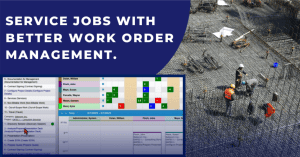Written by Andrew Lichey
Field service management (FSM) and customer relationship management (CRM) are essential solutions for field technicians. Platforms such as FSM Zoho or integrated CRM FSM systems can transform how service teams operate. While each tool manages distinct processes, lack of integration leads to missed opportunities and inefficient workflows. By implementing FSM CRM integration, both field service and CRM solutions can seamlessly share real-time customer data.
FSM and CRM are often integrated with enterprise resource planning (ERP) to avoid duplicate data entry or errors from missing information, and to enable real-time data sharing. In most environments, integrating FSM software with CRM software provides additional benefits, allowing organizations to deliver consistent experiences whether a customer interacts with a CRM user or a field service technician. Many software vendors offer standard integration models with ERP products. Ideally, businesses employ integration FSM strategies—such as FSM Zoho CRM extensions or CRM Zoho FSM solutions—to keep customer data synchronized, reduce errors and improve service request management.
A Spotlight on FSM
Managing the customer experience is the role of the CRM solution, while FSM software ensures customers are served successfully and profitably in the field. Enterprise-grade software offers a range of functions, but several key areas define effective FSM software:
- Dispatch and service scheduling, appointment setting, calendar-based scheduling from maintenance plans and automated scheduling optimization. Sophisticated dispatch and scheduling software improve response times and customer satisfaction.
- Issuing and recording completion of work orders. When combined with CRM integration FSM capabilities, this information helps sales service teams track progress more effectively.
- Contract management to ensure service agreements are followed, even when terms are customer-specific.
- Service inventory, including inventory on each technician’s vehicle. Robust data synchronization between FSM extensions and the CRM Zoho environment prevents discrepancies.
- Warranty management, enabling field technicians to determine which work is covered by warranty and which requires additional charges.
- Tools for technicians to upsell new services, issue quotes and secure quote approvals. Extension Zoho CRM solutions streamline this process for field service teams.
- Reverse logistics to return parts and subcomponents to inventory, repair or scrap them, track ownership and determine entitlement for replacements.
- Service billing to collect details of billable service, pass them to ERP for invoicing and provide customers with visibility into billing activity in the field. Integrating CRM field service approaches with FSM extension Zoho ensures billing accuracy.
Highlighting FSM software’s core features is important because even if a CRM package includes some field service capability, it cannot deliver all the functions needed for effective field service management. Running advanced field service products as standalone entities often leaves gaps in addressing the full customer lifecycle, maximizing revenue, leveraging service histories, reducing service request times and improving customer satisfaction.
Providing a Full Picture
Combining CRM and field service systems enables improved customer service and new revenue opportunities. A field technician using CRM can view what service has been performed on a customer’s equipment, and—based on service frequency, cost, parts and predictive analytics—record sales opportunities to potentially replace equipment. An integration CRM layer ensures field technicians access critical information to boost sales and create new revenue streams.
For example, a field service technician may discover a customer site is expanding and quickly create a sales opportunity for additional equipment. Combining CRM and FSM is essential, as companies deliver better experiences when employees across the organization know about recent customer conversations, transactions, service calls, open issues, customer-specific requirements and correspondence. Effective CRM Zoho or Zoho FSM extensions unify this data, ensuring service teams always have the latest information.
Better Information Sharing
Bi-directional integration between FSM and CRM is needed to keep data synchronized and updated in both systems. If service history and ongoing sales activity are not recorded, neither field service nor customer service personnel will have a complete view of customers and their needs. The right FSM CRM approach stores service histories in a single repository, making it easier to deliver consistent customer experiences and reduce response times.
Field service technicians with visibility into sales history gain knowledge of products and equipment at customer sites not covered by service agreements—potentially representing new revenue opportunities. Warranty information and contract management also provide CRM users with insight into sales opportunities for each customer and show how well the field organization is performing against contractual requirements. Leveraging scheduling or dispatch software directly from an integrated FSM extension streamlines the entire process.
Open Architecture for Enterprise Agility
Not all enterprise software integrations are costly or risky. Solutions built on open integration architecture offer standard, configurable implementations for CRM platforms and should be prioritized. Open architecture enables users to synchronize data quickly across multiple platforms, whether it’s CRM Zoho FSM or a sophisticated FSM Zoho setup.
No two CRM implementations are identical, making each integration unique. This emphasizes the need for configurable and user-friendly integration, with drag-and-drop tools to add or repurpose fields and tables. Integrating FSM extensions with Extension Zoho or Extension Zoho CRM supports efficiency.
Enterprise agility is crucial. As business processes evolve and changes are reflected in platforms like Salesforce or Microsoft Dynamics 365, integration can adapt without custom programming or consulting fees, resulting in quick, cost-effective onboarding. Whether using a management CRM approach or a specialized CRM field service system, open integration ensures rapid adaptation and the ability to seize new opportunities.
Handling Transactions
Planning integration requires decisions about how transactions between systems are managed. Some database fields are integrated synchronously, where a transaction must be confirmed in the other system before it is recorded. Others are handled asynchronously, recorded immediately without acknowledgement from the other system. FSM Zoho CRM or Zoho FSM extension tools help businesses manage these transactional requirements efficiently.
Synchronous integration is vital for transactions such as quotes and estimates that must align with current pricing in CRM or ERP, inventory commitments to ensure available-to-promise status of parts, and credit approvals checked against payment history and credit limits in CRM or ERP. With a robust CRM Zoho or Extension Zoho approach, businesses avoid service delays from incomplete or inaccurate data.
Asynchronous integration is typically used to make the full customer list from CRM available in field service, so technicians can see all contacts at a company. Service history can be periodically updated in CRM to keep customer service and sales informed. Combined with FSM CRM systems, this enables service teams to respond quickly to service requests and deliver a seamless customer journey.
CRM and FSM – The Power Couple
Field service management software should not operate in isolation. Sharing data across the organization is critical to maintaining a competitive advantage, but a sound business case is needed before committing to integration. Organizations should understand how integration will increase competitiveness, customer satisfaction and revenue. FSM CRM integration, whether through FSM Zoho CRM or FSM Extension Zoho, keeps customer data consistent and up to date, while improving field technicians’ access to crucial information in real time.
By combining scheduling software with CRM integration FSM strategies, service teams can manage requests more efficiently, access complete service histories and deliver rapid response times that keep customers engaged. Dispatch software and advanced CRM field service capabilities simplify daily tasks and help maintain excellent customer support.




